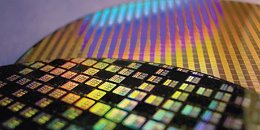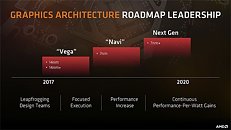Tuesday, August 28th 2018

AMD Chip Manufacturing to Lay Solely With TSMC On, After 7 nm - And Why It's not a Decision, but a Necessity
It's been a tumultuous few days for AMD, as the company has seen Jim Anderson, Computing and Graphics Group leader after the departure of Raja Koduri, leave the company, at a time of soaring share value for the company (hitting $25.26 and leaving short positions well, short, by $2.67 billion.) However, there's one particular piece of news that is most relevant for the company: Globalfoundries' announcement to stop all ongoing development on the 7 nm node.
This is particularly important for a variety of reasons. The most important one is this: Globalfoundries' inability to execute on the 7 nm node leaves AMD fully free to procure chips and technology from competing foundries. If you remember, AMD's spin-off of GlobalFoundries left the former with the short end of the stick, having to cater to GlobalFoundries' special pricing, and paying for the privilege of accessing other foundries' inventories. Of course, the Wafer Supply Agreement (WSA) that is in place will have to be amended - again - but the fact is this: AMD wants 7 nm products, and GlobalFoundries can't provide.To the forumites: this piece is marked as an editorial
AMD's CTO Mark Papermaster wrote thus in a blog post:
Should anything befall TSMC, should the silicon giant trip, AMD will have all of its product portfolio endangered. Consumer and professional GPU and CPU products will all be manufactured under TSMC's 7 nm process, as AMD has stated time and again - and in quite an aggressive manner. Here's hoping other players step up to the 7 nm manufacturing task, or, that being as hard as it is, that nothing affects TSMC's ability to deliver, lest one giant brings down others with it.
Sources:
AMD Blogs, via TechSpot
This is particularly important for a variety of reasons. The most important one is this: Globalfoundries' inability to execute on the 7 nm node leaves AMD fully free to procure chips and technology from competing foundries. If you remember, AMD's spin-off of GlobalFoundries left the former with the short end of the stick, having to cater to GlobalFoundries' special pricing, and paying for the privilege of accessing other foundries' inventories. Of course, the Wafer Supply Agreement (WSA) that is in place will have to be amended - again - but the fact is this: AMD wants 7 nm products, and GlobalFoundries can't provide.To the forumites: this piece is marked as an editorial
AMD's CTO Mark Papermaster wrote thus in a blog post:
AMD's next major milestone is the introduction of our upcoming 7nm product portfolio, including the initial products with our second generation "Zen 2" CPU core and our new "Navi" GPU architecture. We have already taped out multiple 7nm products at TSMC, including our first 7nm GPU planned to launch later this year and our first 7nm server CPU that we plan to launch in 2019. Our work with TSMC on their 7nm node has gone very well and we have seen excellent results from early silicon. To streamline our development and align our investments closely with each of our foundry partner's investments, today we are announcing we intend to focus the breadth of our 7nm product portfolio on TSMC's industry-leading 7nm process.The thing is, AMD going solely with TSMC for 7 nm isn't a decision: it's a necessity. It's a necessity of increasing need for AMD to bank on its powerful forward momentum against Intel on the CPU wars. It's essential for AMD's continued push in the professional, server field. And it's of utmost importance for AMD's relevance in graphics technologies against NVIDIA's frankly dominating position (despite AMD controlling all high-performance games consoles, a strategy that will only increase its fruits for AMD, should they be able to maintain this exclusivity - and all points towards that). Zen 2, EPYC 2, Vega 20, Navi - those are not only sizeable pieces of AMD's product portfolio, these are its bread and butter.As great as that part of the deal is for AMD, there's an obvious drawback of yet another foundry being left in the dust of new node developments: the weight of the world's semiconductor manufacturing capability on the 7 nm node - and AMD's efforts in it - stand solely on the shoulders of one player. And that's not even looking into actual output for TSMC's 7 nm node, how many customers will want to manufacture their chips on it, and whether or not TSMC has the ability to satisfy demand from all players.
Should anything befall TSMC, should the silicon giant trip, AMD will have all of its product portfolio endangered. Consumer and professional GPU and CPU products will all be manufactured under TSMC's 7 nm process, as AMD has stated time and again - and in quite an aggressive manner. Here's hoping other players step up to the 7 nm manufacturing task, or, that being as hard as it is, that nothing affects TSMC's ability to deliver, lest one giant brings down others with it.






87 Comments on AMD Chip Manufacturing to Lay Solely With TSMC On, After 7 nm - And Why It's not a Decision, but a Necessity
www.fool.com/investing/2016/06/01/where-does-ibm-rank-in-software-and-hardware.aspx
edit: This is after they sold the x86 division to Lenovo btw.. so these are all Power based.
Precisely I said "server CPU market is worth" and that's how analysts talk about it. That's because you can actually price / buy x86 CPUs. :-)
This market is estimated at ~$18bln and Intel has 99%. AMD has 1%. Of course this will change in 2018 figures.AMD is the 1% (2017 figures!). Other architectures aren't included, since you buy whole systems.For 2017 IBM reported $6.5bln revenue from hardware - that's POWER, z and storage solutions.
These are whole machines, so we'd have to compare them to how much the server market is worth. I'm seeing very different estimations, but mostly in the $80-100bln range, so IBM's share would be around 6-8%.
Seriously... You are dealing with people who treat "altruism" as a cuss word. Give up.
For every opposite action, etc., etc..
This kind of horror had it's extreme counterpart in unfettered "selfishness". It created people like her who celebrated the exact opposite ideal of communism.
Both were wrong though. True altruism - as well as individuality (what the so call Rand adherents want) is elsewhere. My 2c.
Thing is it's really OT in this thread.